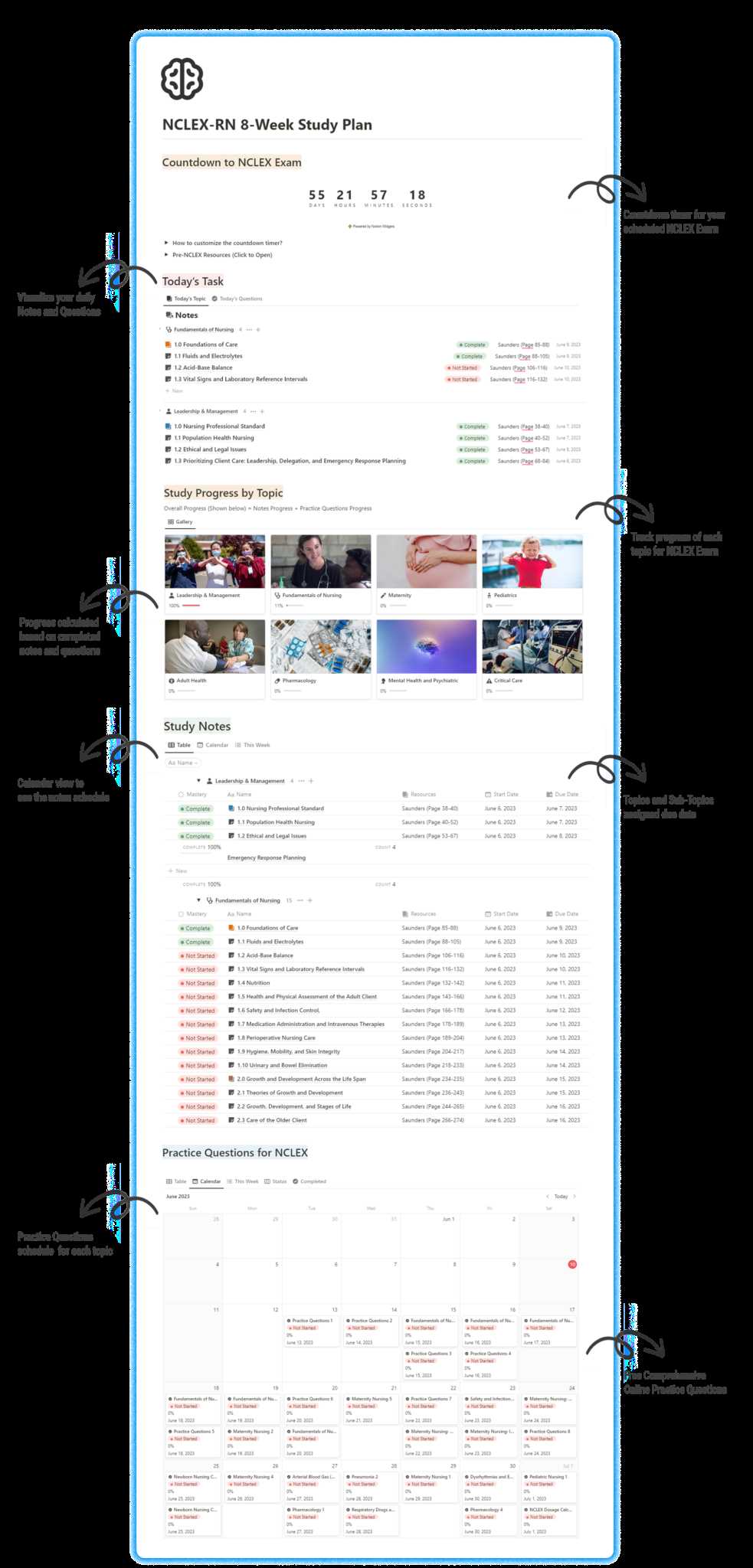
Effective preparation for any major certification requires a well-organized approach. Without a clear schedule, it can be challenging to stay on track and ensure that all critical topics are thoroughly reviewed. Crafting a personalized plan that allocates enough time for each subject area allows for a more efficient study routine and reduces stress as the exam date approaches.
Staying organized and adhering to a defined timeline is essential for success. It’s easy to underestimate the time needed for certain topics or overestimate your capacity to absorb material without proper planning. Breaking down your study process into smaller, manageable segments ensures that each area is given the focus it deserves.
One of the best ways to stay committed to your study schedule is by using a visual tool that maps out all your sessions. This helps you avoid procrastination and makes sure you’re dedicating the right amount of time to each topic. With the right approach, even the most overwhelming exam preparation can be broken into bite-sized tasks that can be tackled one by one.
What is an NCLEX Calendar Template?
Preparing for a critical licensure examination requires careful planning and structured study. A tool designed to assist in organizing the study process can significantly enhance one’s chances of success. By breaking down the journey into manageable segments, individuals can ensure they cover all necessary topics effectively and on time.
Structured Approach to Exam Preparation
A well-designed planning tool helps students allocate specific times for each subject, balancing study sessions with necessary breaks. It acts as a roadmap, guiding candidates through each step toward mastering the material required for the exam.
Ultimate Benefits of Using a Study Planner
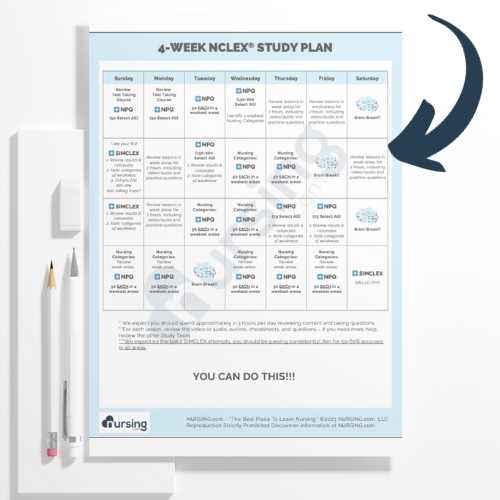
Utilizing such a system offers clarity and focus, reducing the overwhelming feeling that often accompanies exam prep. It also helps in monitoring progress, ensuring that all areas are addressed, and preventing any last-minute rush or missed concepts.
Benefits of Using a Study Calendar
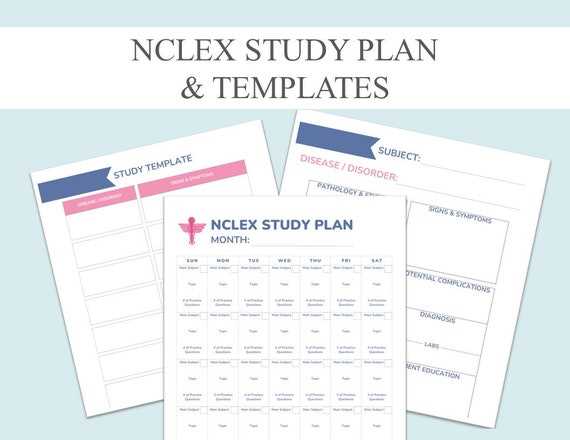
When preparing for a major exam, having a structured approach is crucial for managing time effectively and ensuring adequate preparation. By organizing your study sessions, you can enhance your focus and avoid feeling overwhelmed. A well-planned schedule can provide direction and help you stay on track, making the journey towards success more manageable.
Improved Time Management
One of the most significant advantages of using a structured study plan is the ability to manage your time more effectively. By breaking down the material into smaller, more manageable chunks, you can ensure that each topic receives the attention it requires. This helps prevent cramming and promotes consistent, steady progress over time.
Reduced Stress and Anxiety
Having a clear plan in place can greatly reduce feelings of uncertainty and stress. Knowing exactly what needs to be studied each day eliminates the anxiety of wondering whether you’re covering enough material. A structured approach not only boosts confidence but also allows for regular breaks and self-care, contributing to better overall well-being during the preparation process.
Consistency and Motivation are key factors in achieving success, and a well-organized approach makes it easier to stay consistent. By setting realistic goals and tracking your progress, you’ll be motivated to continue working hard towards your objectives.
How to Create a Personalized Template
Designing a plan that fits your individual needs and study habits can significantly enhance your preparation. By organizing your time and structuring your activities according to your preferences, you can create a more effective and manageable routine. This personalized approach not only allows for flexibility but also ensures that you are focused on the areas that matter most to you.
Begin by identifying your goals and deadlines. Knowing when you need to complete specific tasks will help you allocate time accordingly. It’s important to determine which subjects or topics require more attention, as well as when you’ll need breaks or leisure activities to maintain a balanced lifestyle. With this in mind, you can set up blocks of time that are realistic and motivating.
Next, prioritize consistency. Rather than creating a rigid structure that may be hard to maintain, focus on a rhythm that works best for you. For example, some prefer short bursts of focused work, while others may thrive with longer study sessions. Use a format that is easy to follow and visually engaging, helping you stay on track with minimal stress.
Finally, customize your structure with reminders and checkpoints. Regularly assess your progress and adjust your approach if necessary. A flexible design helps you adapt to unforeseen changes, keeping you on course without feeling overwhelmed. Remember, the goal is not perfection but creating a sustainable and productive routine that supports your success.
Essential Features of an NCLEX Calendar
Preparing for a major licensing examination requires organization and careful planning. A well-structured approach is critical to ensure that all necessary study tasks are completed in a timely manner. By organizing preparation into specific time blocks, you can track your progress and allocate enough time for each subject area, reducing the risk of last-minute stress.
Key Components for Effective Planning

There are several important elements that should be included in any study schedule. These features help break down large tasks into smaller, manageable chunks, ensuring comprehensive preparation.
- Specific Dates and Timeframes: It’s essential to have clear deadlines for each phase of your preparation, allowing for flexibility but ensuring no area is overlooked.
- Prioritization of Topics: Identify the most challenging subjects and allocate additional time to them. Having a clear ranking of topics ensures that you focus on areas needing the most attention.
- Regular Breaks: It’s important to incorporate rest periods throughout your study schedule. Frequent breaks help to maintain focus and avoid burnout.
- Progress Tracking: Keeping a log of what you’ve completed helps you stay motivated and provides a sense of accomplishment. It also allows you to assess which areas need more focus.
Flexible Adjustments for Maximum Efficiency
A rigid plan can sometimes lead to stress if things don’t go as expected. It’s crucial to include some flexibility in your planning. This allows you to adjust when unexpected events occur or when certain areas require more time than initially planned.
- Buffer Days: Schedule extra days between study blocks to accommodate unforeseen delays or revisions.
- Review Periods: Include time for review sessions at various intervals, ensuring all information is consolidated before the actual test.
Choosing the Right Study Schedule
Creating an effective plan for exam preparation is essential for achieving success. Finding the right balance between study time and rest, while ensuring that all topics are thoroughly covered, requires careful consideration. An organized and structured approach can make a significant difference in retaining information and improving performance. A well-thought-out routine helps you stay on track, manage stress, and avoid burnout.
Consider your goals and time availability when deciding how to structure your study sessions. Take a realistic look at the time you have before the exam and break it down into manageable chunks. This allows for focused study periods without feeling overwhelmed. Some may prefer shorter, more frequent sessions, while others may benefit from longer, less frequent intervals. The key is consistency and aligning your schedule with your personal needs and learning style.
Incorporate flexibility into your study plan to account for unexpected events or areas where you may need extra time. Flexibility allows you to adjust without feeling discouraged, ensuring that you stay productive and confident throughout your preparation journey. It is equally important to allow time for relaxation and breaks to recharge your mind and body.
Common Mistakes to Avoid in Planning
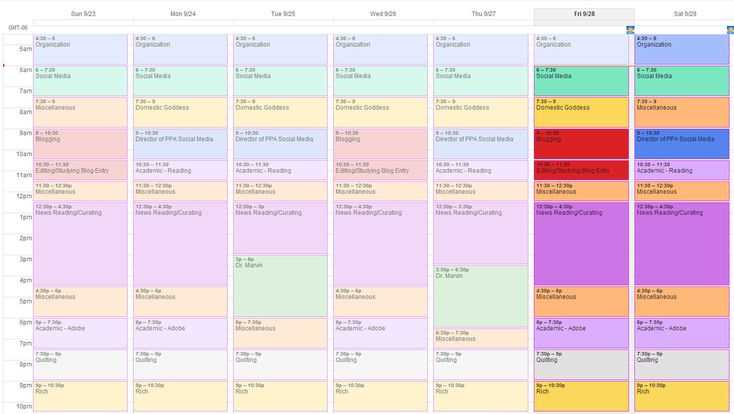
Effective preparation is crucial for achieving success, but many individuals make missteps when organizing their study schedules. These errors can lead to unnecessary stress, poor time management, and ultimately hinder progress. Recognizing these common pitfalls can help ensure a more focused and efficient approach, maximizing the chances of meeting your goals.
Lack of Realistic Goals
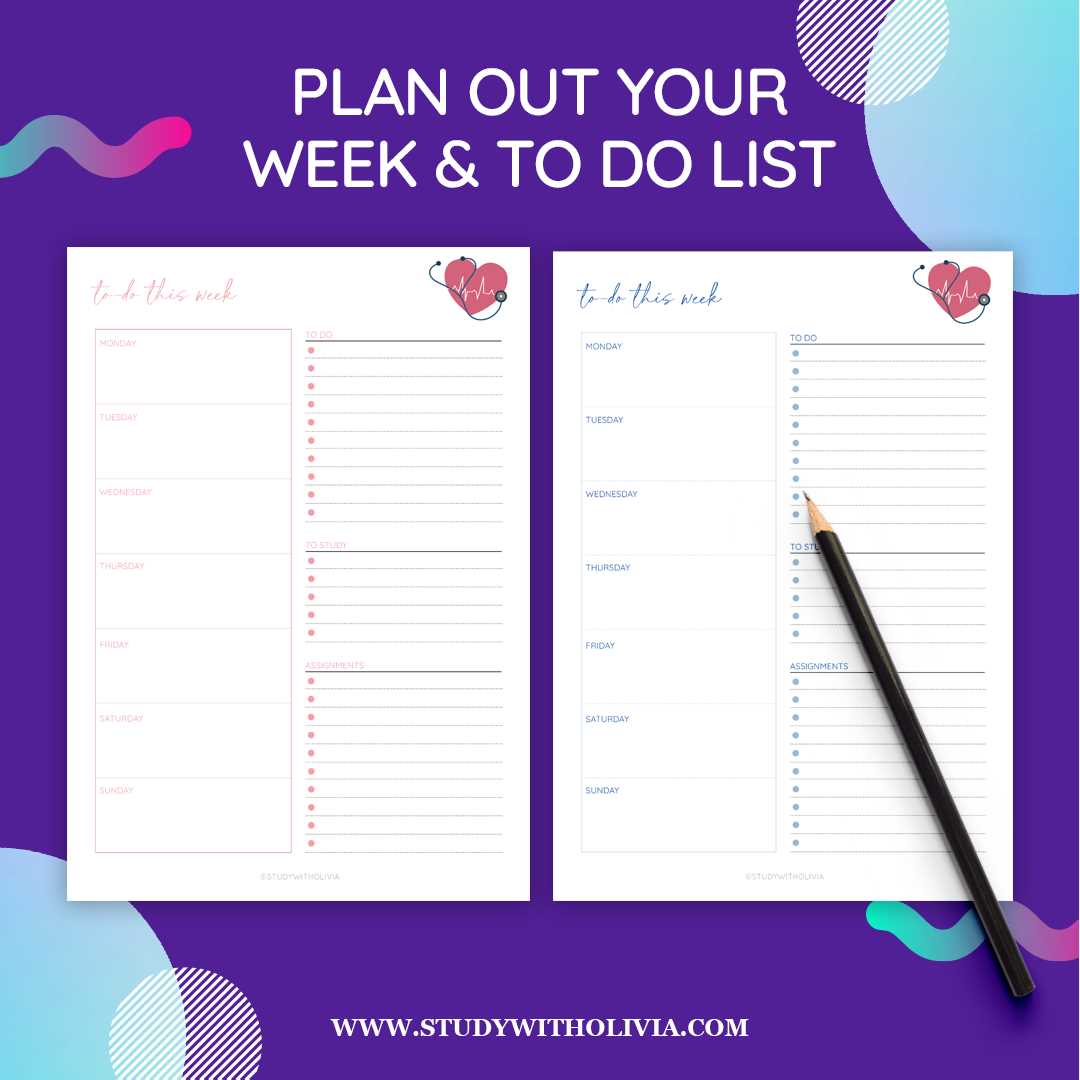
Setting overly ambitious or vague objectives is one of the most frequent planning mistakes. While it’s important to challenge yourself, goals that are too lofty or undefined can create frustration and lead to burnout. It’s essential to set measurable, achievable targets, breaking them down into smaller, manageable tasks. This allows for clear milestones and keeps motivation high throughout the process.
Underestimating Time Commitment
Another common error is misjudging the amount of time required for each task. Whether it’s reviewing materials, taking practice tests, or revisiting difficult topics, it’s easy to underestimate how long these activities will take. To avoid this, be realistic about how much time you can dedicate each day, factoring in breaks and other commitments. It’s better to overestimate time and finish early than to fall behind due to poor time allocation.
Tip: Create a buffer in your schedule for unexpected delays or additional review, which can help keep you on track even when things don’t go as planned.
Neglecting Rest and Self-Care
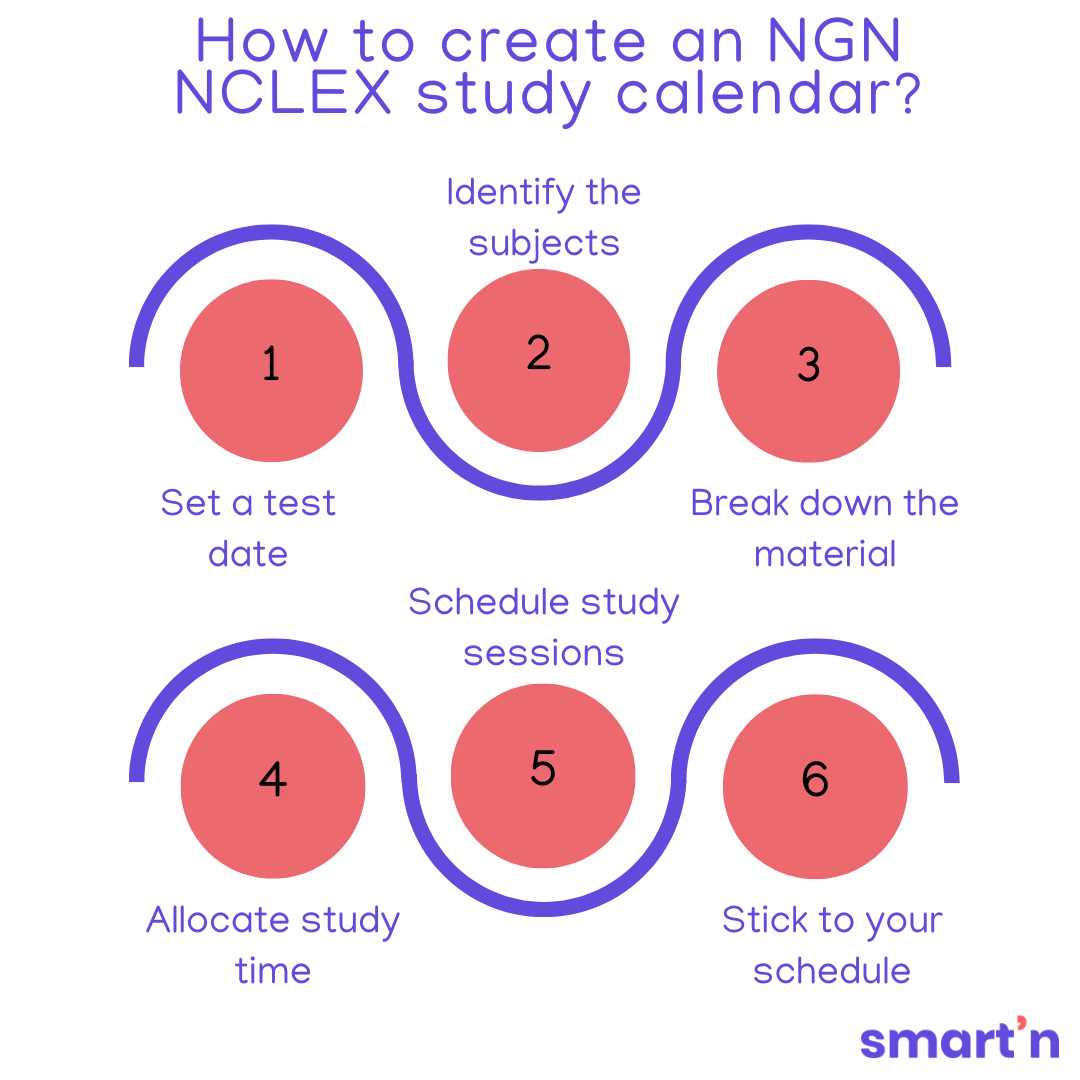
Planning should not solely focus on study hours. Failing to incorporate proper rest and self-care into your routine can lead to mental fatigue and decreased performance. It’s crucial to schedule downtime, ensure adequate sleep, and engage in activities that reduce stress. Regular breaks and a balanced lifestyle contribute to sustained productivity and well-being.
Remember, a well-rested mind is far more efficient than one that is overworked.
Time Management Tips for NCLEX Prep
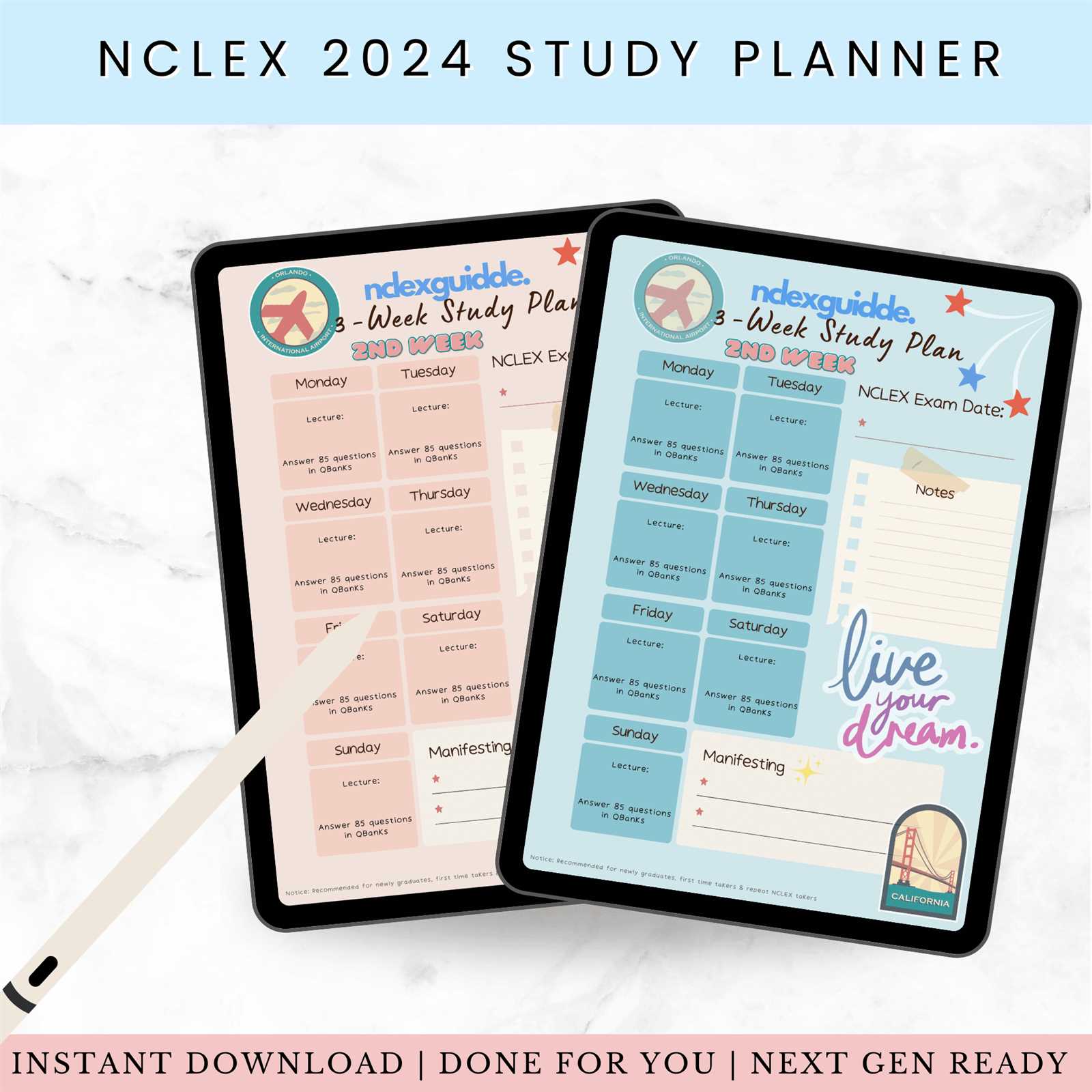
Effective time management is key to mastering any comprehensive exam. When preparing for a challenging nursing assessment, it’s crucial to allocate your time wisely to cover all necessary topics without overwhelming yourself. Proper planning ensures that you approach each study session with focus and clarity, while also leaving room for breaks and relaxation. Here are several strategies to help you stay on track and make the most of your preparation period.
- Create a Structured Study Schedule: Plan your days and weeks ahead of time, specifying what you will study and when. Break down large topics into smaller, manageable sections to avoid feeling overwhelmed.
- Prioritize Weak Areas: Identify the subjects or concepts that require the most attention. Focus more time on these areas, and review them regularly to solidify your understanding.
- Set Daily Goals: Establish achievable goals for each study session. Whether it’s completing a certain number of practice questions or reviewing a chapter, clear targets will keep you motivated.
- Incorporate Breaks: Taking short breaks between study sessions helps prevent burnout. Use techniques like the Pomodoro method, which involves studying for 25 minutes followed by a 5-minute break.
- Use Active Learning Techniques: Instead of passively reading, engage with the material. Take notes, create flashcards, or test yourself on key concepts. Active learning promotes better retention.
- Review Regularly: Consistency is essential. Schedule time each week for reviewing previously studied material to reinforce your knowledge and improve recall.
- Stay Flexible: Life happens, and sometimes things don’t go as planned. Be prepared to adjust your schedule if needed, but stay focused on your long-term goals.
- Practice Time Management During Mock Exams: Simulate the test environment by practicing with timed tests. This will help you get comfortable managing time during the actual exam.
By following these tips, you can maximize your study efforts, avoid unnecessary stress, and ensure you are well-prepared when the time comes for the exam. With disciplined time management, success is within reach!
How to Track Progress Effectively
Tracking progress is crucial for staying focused and organized while preparing for any important exam or goal. By monitoring your development over time, you can identify areas that need more attention and adjust your study methods accordingly. This process allows for a clear understanding of how much you’ve accomplished and where further improvement is necessary.
Set clear milestones to measure your progress. Break down your larger objectives into smaller, more manageable tasks that can be tracked easily. This could include daily, weekly, or monthly checkpoints, depending on your schedule and goals. Achieving these smaller goals will give you a sense of accomplishment and motivation to continue.
Review regularly and evaluate your performance to see if you’re on track. This could mean revisiting your work to analyze strengths and weaknesses or testing yourself on material you’ve covered. Regular self-assessment helps to refine your approach and ensures that you’re dedicating enough time to challenging topics.
Consistency is key in tracking your progress. Establishing a routine to check in on your goals helps create a habit, making the process of monitoring your growth more natural. Whether it’s through written notes or digital tools, regular tracking will keep you aligned with your target outcomes.
Lastly, adjust your plan when necessary. If you find that certain strategies aren’t yielding the results you hoped for, don’t be afraid to change your approach. Flexibility is essential to maintaining progress and avoiding frustration. A well-structured yet adaptable plan can lead you to success more effectively.
Incorporating Breaks into Your Plan
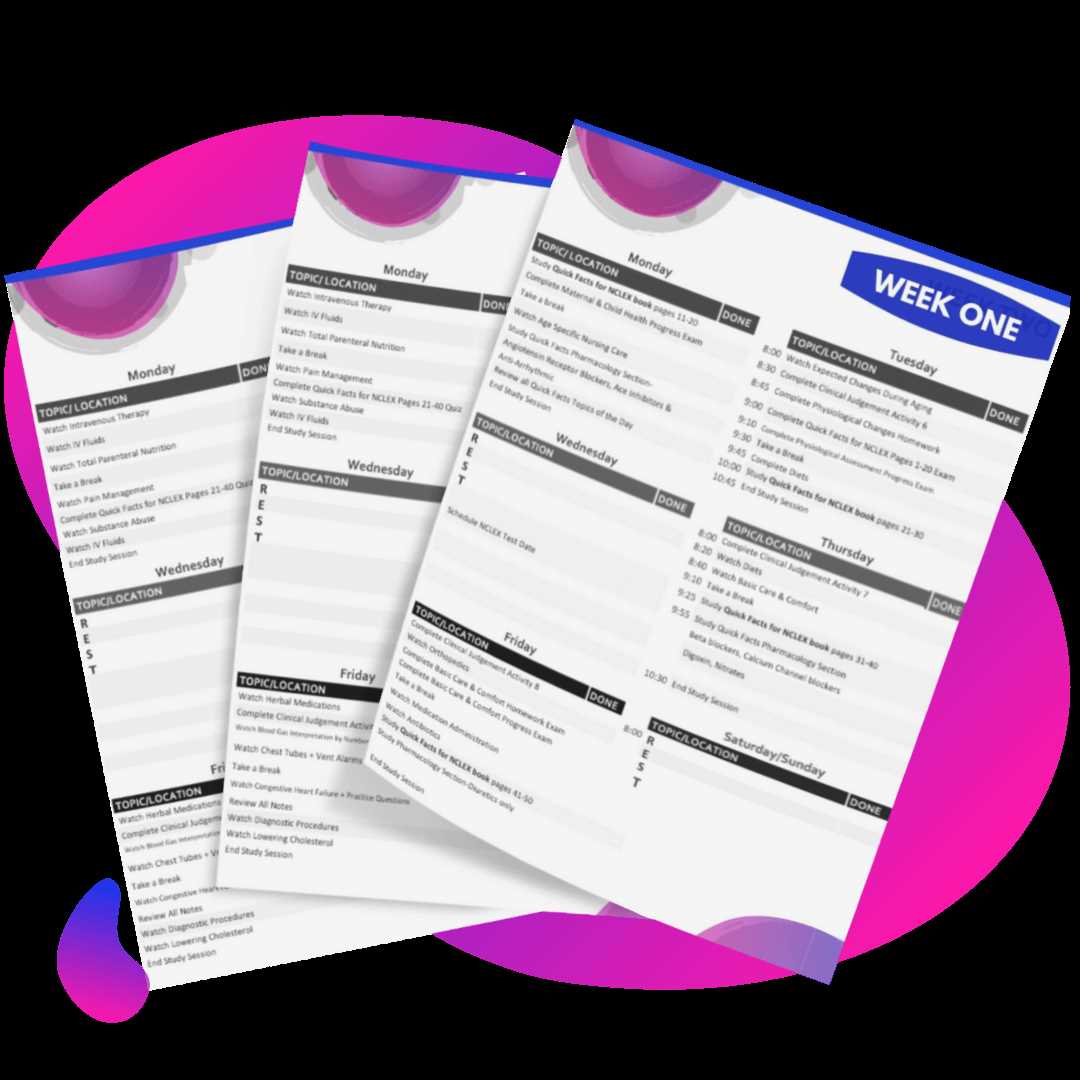
When preparing for an important exam, it’s essential to build a structured approach that includes adequate time for rest and recovery. Studying continuously without breaks can lead to burnout, decreased focus, and diminished retention of information. Therefore, integrating intentional pauses in your study routine can enhance productivity and overall well-being, helping you to maintain optimal performance throughout the preparation period.
Why Breaks Matter
Breaks play a crucial role in preventing mental fatigue and improving cognitive function. When you take regular pauses, you give your brain the opportunity to consolidate knowledge, process new information, and regain energy for the next session. Short intervals of rest can lead to better concentration and improved problem-solving skills, making your study sessions more effective.
How to Schedule Breaks Effectively
To make breaks a productive part of your study strategy, consider the following tips:
- Set clear boundaries for work and rest periods. Use a timer to ensure that you don’t get distracted during study intervals.
- Incorporate short breaks every 25-30 minutes of focused work. A 5-10 minute pause can be enough to recharge your mind.
- Take longer breaks after extended study sessions. A 30-minute to 1-hour break every few hours allows your brain to fully reset.
- Vary your break activities to keep things refreshing. Stretch, take a walk, listen to music, or even meditate to clear your mind.
Remember that incorporating breaks doesn’t mean you’re procrastinating; it’s a necessary part of an effective and sustainable study plan. By ensuring that rest is prioritized, you’ll maintain a higher level of focus and motivation over time.
Using Digital vs. Printable Templates
When it comes to organizing study schedules or managing exam preparation, people often face a choice between digital tools and physical resources. Each approach offers distinct advantages depending on individual preferences and study habits. The decision between using an electronic format or a hard-copy version can impact the overall efficiency and experience, especially in terms of accessibility, customization, and flexibility.
Digital solutions provide a range of interactive features that can make planning and tracking progress easier. They can be updated instantly, synced across multiple devices, and often come with notifications to keep users on track. On the other hand, physical planners offer a tangible, distraction-free experience, and many find writing things down enhances retention and focus.
| Feature | Digital Format | Printed Format |
|---|---|---|
| Accessibility | Available anytime, anywhere via devices | Requires physical access, limited portability |
| Customization | Highly customizable with various tools and apps | Fixed layout, limited customization |
| Updates | Instant updates, real-time changes | Manual updates, requires rewriting |
| Engagement | Interactive, often includes reminders | Hands-on, enhances tactile engagement |
| Distractions | Can be prone to interruptions (e.g., notifications) | Minimal distractions, focus on task |
Adapting the Calendar to Your Needs
Every individual has a unique learning style, schedule, and set of priorities, which means that a one-size-fits-all approach to studying for exams is rarely effective. Customizing your study plan is essential for maximizing productivity and ensuring that you stay on track while preparing for the big test. Tailoring the structure of your preparation routine to fit your specific needs will help you focus on areas that require more attention, while allowing flexibility for personal obligations.
To effectively adjust your plan, start by identifying key aspects that impact your study habits and environment. These might include:
- Your peak productivity hours (morning, afternoon, evening)
- The amount of time you can realistically dedicate to studying each day
- Your preferred study methods (e.g., reading, practice questions, group study)
- Personal commitments or work schedules that need to be accommodated
Once you’ve evaluated these factors, you can begin to structure your study sessions in a way that optimizes your time and energy. Here are some ideas for customizing your plan:
- Set realistic goals: Break your preparation into manageable milestones, focusing on specific topics each week to avoid feeling overwhelmed.
- Prioritize weak areas: If certain subjects or concepts are more challenging, allocate additional time for review and practice.
- Integrate breaks and rest: Regular short breaks and days off will help prevent burnout and keep your mind fresh.
- Stay flexible: Life can sometimes interrupt even the best-laid plans. Allow room for adjustments when unexpected events occur.
Ultimately, the key to success lies in finding a balance that works for you–one that keeps you on track while allowing for the flexibility to adjust as needed. A well-adapted plan will not only improve your chances of success but also enhance your overall study experience.
Adjusting Your Schedule as Exam Day Approaches
As your test date draws near, it’s important to refine and fine-tune your study routine to ensure you’re as prepared as possible. While you’ve likely followed a consistent plan up until now, the final weeks before the exam call for adjustments that focus on sharpening your skills and reinforcing your knowledge. In this phase, balancing review with relaxation becomes key to maintaining focus and reducing stress.
Focusing on Key Areas
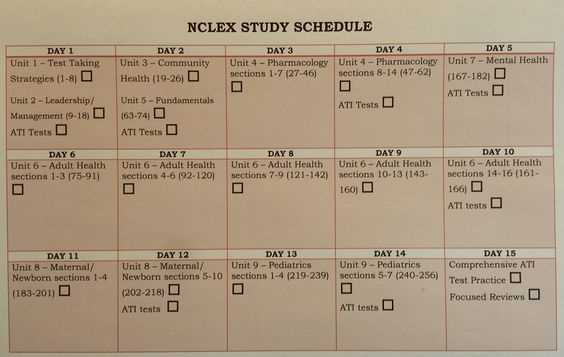
In the final stretch, prioritize areas that need improvement or seem to be more challenging. Revisiting difficult topics or practicing complex questions can help boost your confidence and address any weak spots. Focus your energy on strengthening these areas without overloading yourself with new material.
Incorporating Rest and Relaxation
While increasing study intensity is important, it’s equally essential to schedule time for rest. As the exam approaches, over-studying can lead to burnout, which will affect your performance. Ensure you get enough sleep and take short breaks to keep your mind sharp and avoid exhaustion.
| Week | Focus Areas | Additional Activities |
|---|---|---|
| Week 1 | Review difficult topics, practice questions | Focus on relaxation techniques |
| Week 2 | Practice timed tests, simulate exam conditions | Incorporate physical activity for stress relief |
| Week 3 | Final review of all key subjects, reinforce weak areas | Ensure proper rest, maintain healthy routine |
As the big day approaches, be sure to adjust your schedule to maintain a healthy balance between preparation and self-care. This will help you approach the exam with clarity and confidence, giving you the best possible chance of success.
How to Stay Motivated with a Calendar
Staying motivated throughout a long and demanding process can be challenging. One effective way to keep yourself on track is by using a structured plan that breaks down tasks into manageable steps. This visual approach provides clear milestones, turning overwhelming goals into achievable, bite-sized actions. By organizing your time, you can create a sense of progression, which helps maintain focus and motivation over time.
Setting Realistic Milestones
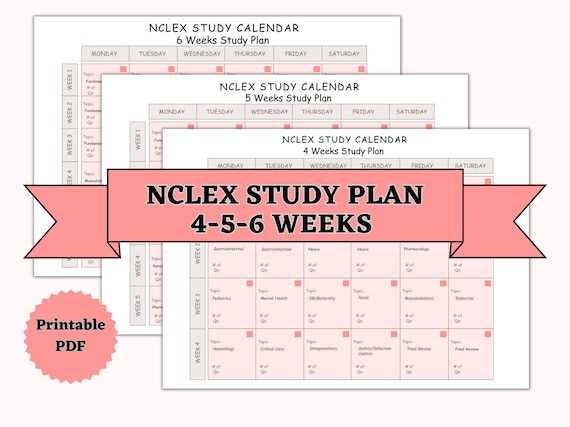
When planning, it’s important to set realistic and measurable milestones. This allows you to track your progress and celebrate small wins along the way. For example, breaking down a larger goal into weekly or daily tasks makes it feel less daunting. Each completed task brings you closer to your ultimate objective, which in turn boosts your confidence and keeps you engaged in the process.
Visual Reminders to Stay On Track
Seeing your progress visually can be an incredibly motivating factor. Whether it’s checking off completed tasks or using color-coding to prioritize, visual cues provide constant reminders of your goals. This method not only keeps you organized but also creates a rewarding experience as you mark off each accomplishment, reinforcing positive habits and helping you stay committed.
Examples of Successful NCLEX Study Plans
Creating a structured approach to preparing for a nursing exam is key to ensuring success. The process involves breaking down study sessions into manageable blocks and balancing intensive review with regular breaks. Effective plans are tailored to an individual’s strengths and weaknesses, as well as their schedule and learning preferences.
Example 1: Focused Review Strategy – One popular method is a focused study schedule, where each day is dedicated to a specific topic area, such as pharmacology, patient care, or safety protocols. This strategy helps to build deep understanding in one area before moving on to the next. Regular mock exams are included to measure progress.
Example 2: Balanced Daily Routine – Another approach involves creating a balance between study time and self-care. A typical day could include two to three hours of review, followed by physical exercise or relaxation techniques. This ensures mental clarity and reduces stress, which is essential for long-term retention of material.
Example 3: Peer Study Groups – Some individuals prefer collaborative learning. Joining a study group allows for the exchange of ideas, clarification of doubts, and peer support. Study groups often incorporate interactive sessions such as quizzes and discussions to reinforce key concepts.
Ultimately, the key to success is consistency, focused effort, and maintaining a plan that suits your learning style and lifestyle.
How to Handle Study Overload

Managing excessive study demands can be overwhelming, but with the right approach, you can maintain balance and focus. It’s essential to recognize when the workload starts to feel unmanageable and take proactive steps to address it. By setting priorities, organizing your tasks, and taking care of your well-being, you can navigate through periods of intense academic pressure without burning out.
Prioritize Tasks Effectively
The first step in handling a heavy study load is identifying the most urgent and important tasks. Not all assignments or topics carry the same weight, so it’s crucial to focus on what matters most.
- List your assignments or study topics and rank them by importance or deadlines.
- Break down larger tasks into smaller, more manageable segments.
- Ensure you allocate time for each item based on its priority level.
Incorporate Breaks and Rest
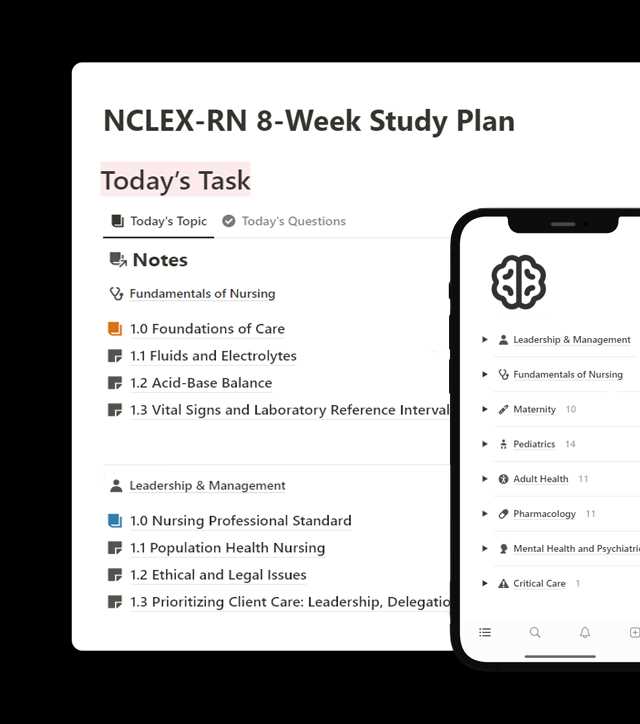
While it may seem counterproductive, taking regular breaks is vital to maintaining mental clarity and focus. Studying for long, uninterrupted hours can lead to fatigue and decreased productivity.
- Follow the 25-5 rule: study for 25 minutes, then take a 5-minute break.
- Ensure you take longer breaks every couple of hours to recharge.
- Sleep is just as important as study time – don’t sacrifice rest to study more.
Final Review and Last-Minute Prep Strategies
As your exam date approaches, the final days of preparation are critical. At this stage, the goal is not to learn new material, but to reinforce what you already know and ensure you’re mentally prepared for the test. The key is to focus on a targeted review strategy, manage your time effectively, and maintain a calm, confident mindset as you get closer to the big day.
Here are some key strategies for your final review:
- Prioritize Key Concepts: Focus on the most important areas that are often tested. Review summaries, important formulas, or clinical guidelines that can make a significant impact on your performance.
- Practice Time Management: Simulate exam conditions by taking full-length practice tests. This will help you build stamina and ensure that you can pace yourself appropriately during the actual exam.
- Use Active Recall and Spaced Repetition: Instead of passively reviewing notes, quiz yourself or use flashcards. Spaced repetition helps reinforce your memory and ensures better retention of key information.
- Review Mistakes: Focus on areas where you’ve made errors during practice tests or quizzes. Identify patterns and make sure you understand why you got certain questions wrong.
- Stay Calm and Rested: Mental fatigue can be your worst enemy in the final stretch. Prioritize sleep and take breaks to avoid burnout. A refreshed mind will retain information better and perform more effectively.
In the final hours before your exam, aim for a light review. Avoid cramming or overwhelming yourself with too much information. Instead, relax and trust in the preparation you’ve already done.
Maximizing Your Performance on Test Day
Effective preparation for an important exam involves more than just studying the content. On the day of the test, your ability to perform at your best is influenced by various factors such as time management, mental focus, and physical readiness. To optimize your performance, it’s essential to have a clear strategy in place for the day of the exam. This strategy should incorporate everything from how to manage pre-test stress to staying focused and energized during the test itself. By taking a systematic approach, you can significantly enhance your chances of success.
Here are key tips for ensuring you are ready to perform your best on the test day:
| Strategy | Why It Matters | How to Implement |
|---|---|---|
| Get Enough Rest | Sleep is crucial for memory retention and focus. | Ensure 7-8 hours of sleep the night before the exam. |
| Eat a Balanced Meal | Proper nutrition supports cognitive function and energy levels. | Eat a healthy breakfast with protein, fruits, and whole grains. |
| Stay Hydrated | Dehydration can impair concentration and decision-making. | Drink water throughout the morning leading up to the exam. |
| Arrive Early | Being early reduces anxiety and allows time to settle in. | Arrive at the exam location at least 30 minutes before the start time. |
| Practice Deep Breathing | Relaxation techniques can help reduce stress and anxiety. | Take deep breaths for a minute before entering the exam room. |
| Stay Calm and Focused | Maintaining composure helps improve decision-making and accuracy. | If you feel overwhelmed, take a short break and refocus. |
Implementing these strategies will not only help you feel more confident but also increase your chances of performing at your peak level. Remember, it’s not just about knowing the material–your overall mental and physical state on test day plays a crucial role in your success.